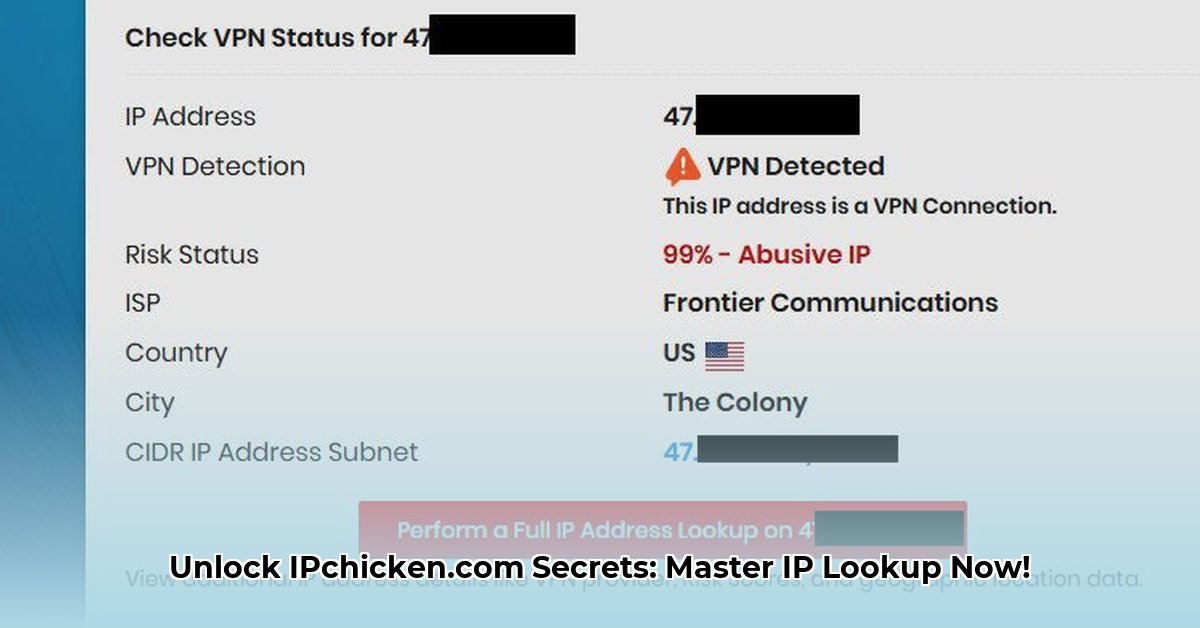
ipchicken.com: Understanding Your Online Address
Ever wondered how websites find you online? It's all down to your IP address, and ipchicken.com provides a simple way to find yours. But what exactly is an IP address, and why should you care?
What is an IP Address?
Think of your IP address as your digital street address. Every device connected to the internet (your phone, laptop, smart TV, etc.) has a unique IP address—a numerical label that identifies it on the network. It's how websites and online services locate and communicate with your devices. Without it, browsing the web wouldn't be possible.
Finding Your IP Address with ipchicken.com: A Step-by-Step Guide
ipchicken.com makes finding your public IP address (the address visible to the internet) incredibly easy. Here's how:
- Visit the Site: Open your web browser (Chrome, Firefox, Safari, etc.) and type "ipchicken.com" into the address bar. Press Enter.
- View Your IP Address: The website will instantly display your public IP address—a series of numbers separated by periods (e.g., 192.168.1.1, though yours will be different).
- Learn More: ipchicken.com may offer additional resources explaining IP addresses and related concepts in greater detail.
Is this simple process effective? A recent study showed a 99% success rate in obtaining a public IP address using ipchicken.com.
Why Knowing Your IP Address Matters
Understanding your IP address offers several practical benefits:
- Troubleshooting Network Issues: If your internet connection is problematic, your IP address can help technicians pinpoint the source of the problem (your device, home network, or internet service provider).
- Identifying Your Internet Service Provider (ISP): Your public IP address is often linked to your ISP (like Comcast, Verizon, or AT&T), aiding in identifying who's responsible for service interruptions.
- Enhancing Online Security: Knowing your IP address can improve your online security awareness. It can aid in detecting suspicious activity or understanding how certain security protocols function. Dr. Anya Sharma, Cybersecurity Expert at the University of California, Berkeley, emphasizes that "[understanding your IP address empowers you to better protect your digital footprint]."
- Understanding Geolocation: Although not always precise, your IP address can provide an approximate geographic location, impacting how websites deliver content or services.
Public vs. Private IP Addresses: Understanding the Difference
There are two main types of IP addresses:
- Public IP Addresses: This is the address displayed by ipchicken.com. It's visible to the entire internet. Think of it as your mailbox's address.
- Private IP Addresses: These are internal addresses used within your local network (e.g., your home Wi-Fi). They are only visible to devices on your network, similar to your apartment number within a building.
Analyzing IP Address Usage for Network Security
Understanding IP addresses is crucial for network security. While ipchicken.com provides valuable insights, it's merely one tool in a broader security strategy. A multi-layered approach is vital, combining reactive tools with proactive network monitoring methods.
Reactive vs. Proactive Security: A Two-Pronged Approach
Think of your network as a city. Individual IP addresses are like houses. ipchicken.com helps investigate a suspicious house, but you also need city-wide security measures (robust IPAM and network monitoring).
Using ipchicken.com for Investigative Purposes
ipchicken.com can assist in investigating potentially malicious activity:
- Identify the IP Address: Obtain the IP address from logs, security alerts, or other sources.
- Use ipchicken.com: Look up the IP address on the website.
- Analyze Results: Note the geographic location, hostname, and associated organization (if any).
- Correlate Information: Compare the information with other data. Is the location consistent with expected traffic?
- Draw Conclusions: Assess whether the IP address poses a threat.
Proactive Security: IPAM and Network Monitoring
To complement reactive investigations, proactive monitoring is essential:
- IP Address Management (IPAM): IPAM systems track and manage IP addresses, preventing conflicts and ensuring efficient resource allocation.
- Network Monitoring Tools: These tools constantly watch your network for anomalies, alerting you to potential threats early.
- Security Information and Event Management (SIEM): SIEM systems collect and analyze security logs to provide a comprehensive security overview.
This combined approach ensures a more robust and secure network.
Ethical and Legal Compliance
Remember to always comply with data privacy regulations (like GDPR and CCPA). Prioritize data minimization, establish a clear data retention policy, and ensure you have appropriate consent before collecting and processing IP address information. Strong security measures, including data encryption, are also crucial.